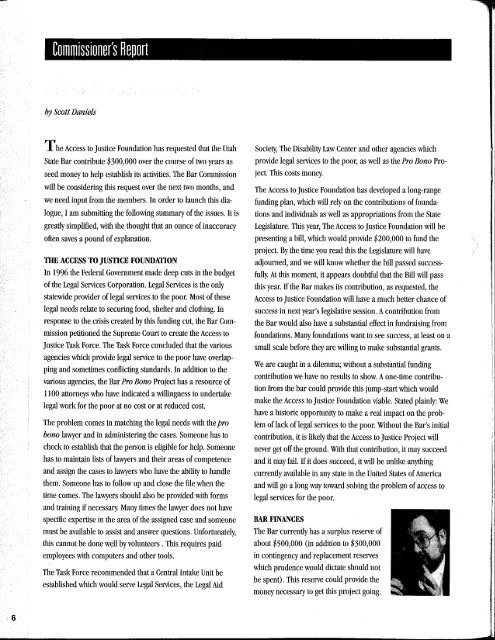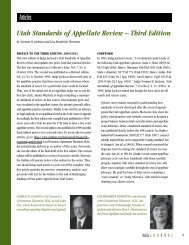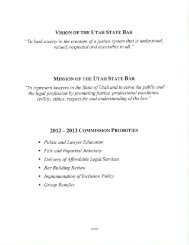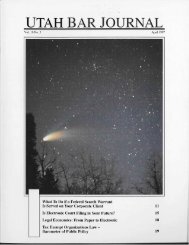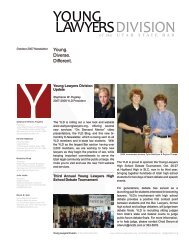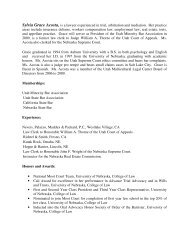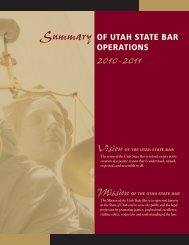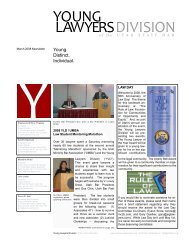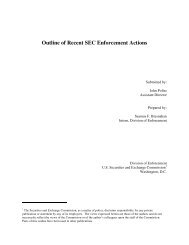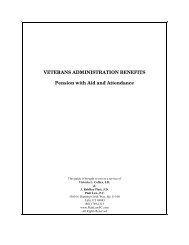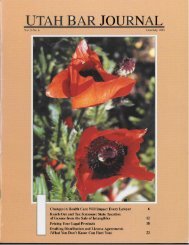March 1999 Volune 12 No3 - Utah State Bar
March 1999 Volune 12 No3 - Utah State Bar
March 1999 Volune 12 No3 - Utah State Bar
You also want an ePaper? Increase the reach of your titles
YUMPU automatically turns print PDFs into web optimized ePapers that Google loves.
6<br />
Commissioner's Report<br />
by Scott Daniels<br />
The Access to Justice Foundation has requested that the <strong>Utah</strong><br />
<strong>State</strong> <strong>Bar</strong> contribute $300,000 over the course of two years as<br />
seed money to help establish its activities. The <strong>Bar</strong> Commssion<br />
wi be considering this request over the next two months, and<br />
we need input from the members. In order to launch this dia-<br />
logue, I am submitting the following summary of the issues. It is<br />
greatly simplied, with the thought that an ounce of inaccuracy<br />
often saves a pound of explanation.<br />
mE ACCESS TO JUSTICE FOUNDATION<br />
In 1996 the Federal Government made deep cuts in the budget<br />
of the Legal Services Corporation. Legal Servces is the only<br />
statewide provider of legal servces to the poor. Most of these<br />
legal needs relate to securing food, shelter and clothing. In<br />
response to the crisis created by this funding cut, the <strong>Bar</strong> Com-<br />
mission petitioned the Supreme Court to create the Access to<br />
Justice Task Force. The Task Force concluded that the various<br />
agencies which provide legal servce to the poor have overlap-<br />
ping and sometimes confcting stadards. In addition to the<br />
various agencies, the <strong>Bar</strong> Pro Bono Project has a resource of<br />
1100 attorneys who have indicated a willngness to undertake<br />
legal work for the poor at no cost or at reduced cost.<br />
The problem comes in matching the legal needs with the pro<br />
bono lawyer and in admistering the cases. Someone has to<br />
check to establish that the person is eligible for help. Someone<br />
has to mainta lists of lawyers and their areas of competence<br />
and assign the cases to lawyers who have the abilty to handle<br />
them. Someone has to follow up and close the me when the<br />
time comes. The lawyers should also be provided with forms<br />
and training if necessar. Many times the lawyer does not have<br />
specifc expertise in the area of the assigned case and someone<br />
must be avaiable to assist and answer questions. Unfortunately,<br />
this canot be done well by volunteers . This requires paid<br />
employees with computers and other tools.<br />
The Task Force recommended that a Central Intake Unit be<br />
established which would serve Legal Servces, the Legal Aid<br />
Society, The Disabilty Law Center and other agencies which<br />
provide legal services to the poor, as well as the Pro Bono Pro-<br />
ject. This costs money.<br />
The Access to Justice Foundation has developed a long-range<br />
fundig plan, which wil rely on the contributions of founda-<br />
tions and individuals as well as appropriations from the <strong>State</strong><br />
Legislature. This year, The Access to Justice Foundation will be<br />
presenting a bil, which would provide $200,000 to fud the<br />
project. By the time you read this the Legislature wil have<br />
adjourned, and we wil know whether the bil passed success-<br />
fuy. At this moment, it appears doubtf that the Bil wil pass<br />
this year. If the <strong>Bar</strong> makes its contribution, as requested, the<br />
Access to Justice Foundation wil have a much better chance of<br />
success in next year's legislative session. A contribution from<br />
the <strong>Bar</strong> would also have a substantial effect in fundraising from<br />
foundations. Many foundations want to see success, at least on a<br />
smal scale before they are wig to make substatial grants.<br />
We are caught in a diemma; without a substantial funding<br />
contribution we have no results to show. A one-time contribu-<br />
tion from the bar could provide this jump-start which would<br />
make the Access to Justice Foundation viable. <strong>State</strong>d plainly: We<br />
have a historic opportunity to make a real impact on the prob-<br />
lem of lack of legal servces to the poor. Without the <strong>Bar</strong>'s initial.<br />
contribution, it is likely that the Access to Justice Project wi<br />
never get off the ground. With that contribution, it may succeed<br />
and it may faiL. If it does succeed, it wil be unlke anything<br />
currently avaiable in any state in the United <strong>State</strong>s of America<br />
and wil go a long way toward solving the problem of access to<br />
legal services for the poor.<br />
BAR FINANCES<br />
The <strong>Bar</strong> currently has a surplus reserve of<br />
about $500,000 (in addition to $300,000<br />
in contingency and replacement reserves<br />
which prudence would dictate should not<br />
be spent). This reserve could provide the<br />
money necessary to get this project going.<br />
I<br />
.<br />
:1<br />
i


